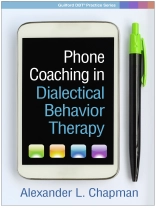This is the first comprehensive guide to phone coaching in dialectical behavior therapy (DBT)–an integral part of treatment that many clinicians find challenging. What are the principles and goals of phone coaching? What limits should be set? How can a therapist manage suicide risk during a brief call? DBT expert Alexander Chapman addresses these and other critical practical questions in this accessible book. He provides guidelines for coaching core DBT distress tolerance and emotion regulation skills; coaching 'dos and don’ts’; and tips for structuring each call’s beginning, middle, and end. Featuring many concrete examples, strategies, and model dialogues, the book includes a key chapter on suicide crisis calls.
Spis treści
1. Introduction and Overview
2. Setting the Stage for Effective Phone Coaching
3. Orientation to Phone Coaching
4. Navigating and Structuring Phone Coaching Calls
5. Core DBT Skills Coaching Principles and Strategies
6. Coaching in Emotion Regulation and Distress Tolerance
7. Navigating Suicide Crisis Calls
8. Principles and Strategies to Address Challenges and Observe Limits
9. Skill Generalization and the Development of Self-Coaching Skills
O autorze
Alexander L. Chapman, Ph D, RPsych, is Professor and Clinical Science Area Coordinator in the Department of Psychology at Simon Fraser University (SFU), in Burnaby, British Columbia, Canada, and president of the Dialectical Behavior Therapy (DBT) Centre of Vancouver. Dr. Chapman directs the Personality and Emotion Research Laboratory at SFU, where he studies the role of emotion regulation in borderline personality disorder, self-harm, impulsivity, and other behavioral problems. He has published numerous scientific articles chapters, and books; presents widely at scientific conferences; and is on the editorial boards of Personality Disorder: Theory, Research, and Treatment, Journal of Personality Disorders, and Behavior Therapy. Dr. Chapman is a DBT Trainer and Consultant with Behavioral Tech. He regularly gives local, national, and international workshops and invited talks on DBT and the treatment of borderline personality disorder; has consulted with and trained clinicians in Canada, the United States, and the United Kingdom; and trains and supervises clinical psychology students. He is a recipient of awards including the Young Investigator’s Award from the National Education Alliance for Borderline Personality Disorder, the Early Career Scientist Practitioner Award from the Canadian Psychological Association, and an 8-year Career Investigator Award from the Michael Smith Foundation for Health Research.












